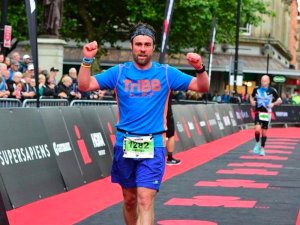In 2020, George Cull, Head of Development at North Yorkshire Sport, attended the Local Government Association Leadership Essentials Course and found it revolutionised his thinking about how his sector could work differently. Instead of thinking about programmes and their evaluation, it encouraged him to make a shift towards thinking of programmes as tools to effect systems change, rather than a programme being the outcome itself.

George Cull
George said, “We’ve had success with numerous programmes over the years, but that success was not about long-term change; it was success in terms of programme evaluation. We felt we could have greatest impact by looking at how to tackle that long term change – building stronger coalitions across organisational boundaries and developing a common purpose.”
“The Leadership Essentials Course exposed me to some really revelatory approaches which fundamentally shifted my thinking about the issues we tackle at work. I felt we were developing the foundations in terms of skills, behaviours and ways of operating that our whole system needed to have.”
George knew instantly that he wanted his wider team to experience systems leadership approaches and could see a future working quite differently. This prompted conversations with the Leadership Centre about how this might be possible and the eventual formation of a system-wide programme delivered across 4 months with 25 participants drawn from across the sector.
“I think I went into the conversation thinking we’d bring the Leadership Centre in for a day and a magic wand would be waved and we’d all be systems leaders, but through those conversations, we designed a programme which would really embed this different way of working over time. One of the best things we did was broaden it out to other partners in the county.
“I think had we gone through the programme as an organisation and then started to behave a bit differently, when we encountered people we consider friends of the organisation they may have been resistant to this altered way of working, so we wanted to bring them on that journey with us. This is not just about the sports and physical activity sector; there are other partners we work with where we look more holistically and it was important to broaden it out to them as well.”
One of those partners commented on the programme: “It’s been great to put names to faces, and better understand everybody’s roles. I think that it will help future partnership working. I value most the openness and honesty of staff within North Yorkshire Sport taking part in the course; it made it very accessible to me as a non-NYS participant.”
The sessions focussed on introducing the theory and providing homework in between each session to put it into practice. It meant that there was practical applicability back in the system and learning that could be shared each time the group came back together.
George described some of the most significant shifts throughout the programme: “Our post-programme review showed that the group had greater awareness of working in complexity, more confidence in their leadership skills and an improved understanding of how to influence when in a position without power or authority.
“One of the key things I noticed was the development of a safe space to be really honest. At times, our desire to present as the expert can override our ability to be vulnerable and authentic. I started to hear some very honest conversations, displaying vulnerability in ways which I hadn’t seen in that group before, so that was really positive.
“I think it was the beginning of the development of a more experimental mindset. It’s been really liberating being able to say, ‘I don’t know the answer to that, but let’s figure it out together.’ The challenge is that sometimes people just want the answer, so you have to convince them that you are still credible without saying, ‘I have the answer’ – because for these complex long-term issues, there is no one answer. You have to be prepared to work experimentally and learn as you go.
“Of course, that complexity isn’t new; it has always been there, but we now understand it a lot better. I think we are far less likely to find ourselves defaulting to simple solutions to address complex problems. That awareness in itself is such a massive step forward.”
Following the programme, the group have shown appetite to get back together, developing a community of practice to continue the work and, importantly, sharing their learning.
“We are already starting to see some of the changes and evolution of colleagues who took part in the programme. I’ve been in sessions where there have been deliberate attempts to get groups to agree a common purpose. I’m hearing a lot of people referencing the different frames that people may have. We have also seen examples of colleagues instigating peer coaching and support for one another, both internally and externally. So we are really starting to see some of those things coming through which have affected our thinking in a really positive way.
“I hope that in four or five years’ time, there is a sense of lots of ‘grey’; organisational boundaries not really feeling like they are there, people without agendas working towards a common purpose, recognising who is best placed to deliver and people being generous with their leadership to lend support where needed. And it feels very much like that’s where we are now headed.”
